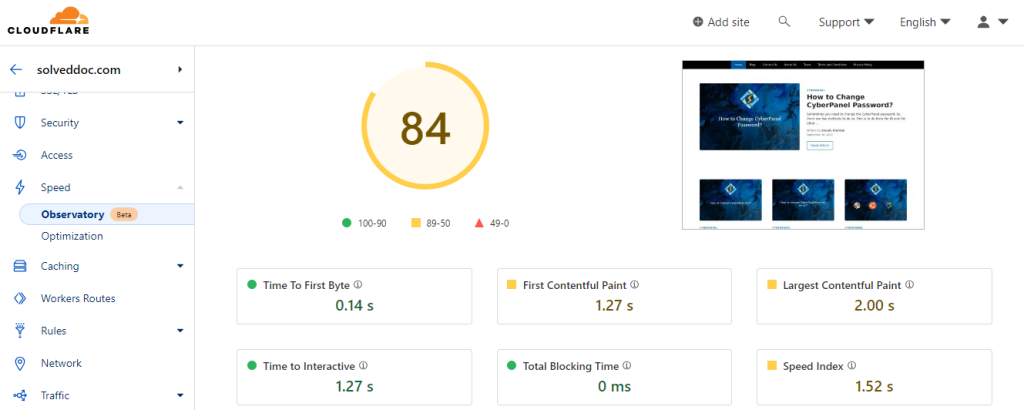Scalable WordPress hosting, often considered the cornerstone of a successful online presence, has revolutionized the way websites are hosted and managed. In a digital landscape where performance, reliability, and the ability to accommodate rapid growth are paramount, scalable WordPress hosting solutions have emerged as a game-changer. With the capacity to effortlessly expand and contract based on the needs of your website, these hosting services empower businesses and individuals to meet the ever-evolving demands of the online world.
In this exploration of scalable WordPress hosting, we will delve into the intricacies of this technology, uncover the benefits it offers, and reveal the various options available to help you make an informed decision that aligns seamlessly with your web hosting aspirations.
What is Scalable Hosting?
In the realm of web hosting, scalability refers to the ability to adjust the resources (such as CPU, RAM, and storage) allocated to your website based on its current demands. It’s like having an elastic infrastructure that expands or contracts as needed, ensuring your site always performs at its best. Scalable hosting is particularly crucial for WordPress websites, as their requirements can change rapidly due to factors like increased traffic, content additions, or even sudden popularity spikes. This adaptability is what makes scalable WordPress hosting a game-changer in the world of online business and content creation.
Why Choose Scalable Hosting for WordPress?
WordPress, known for its user-friendly interface and versatility, powers over 40% of websites on the internet. It’s a preferred choice for bloggers, small businesses, and large corporations alike. However, as your website grows, you’ll encounter new challenges. Scalable hosting offers an array of benefits that address these challenges:
Optimal Performance
A scalable hosting environment ensures that your website consistently delivers fast loading times and responsive user experiences, even during traffic surges.
Reliability
Your site remains accessible and reliable, minimizing downtime and ensuring uninterrupted service for your visitors.
Get exclusive access to all things tech-savvy, and be the first to receive
the latest updates directly in your inbox.
Cost-Efficiency
Scalability allows you to allocate resources on-demand, eliminating the need to overpay for excessive resources when you’re starting out.
Improved SEO
A fast-loading website positively impacts your search engine rankings, helping you reach a wider audience and compete effectively in search results.
Security
Scalable hosting often includes robust security features, protecting your website from threats and vulnerabilities.
Global Reach
Content Delivery Networks (CDNs) can be seamlessly integrated, enabling your website to reach a global audience with low latency and high availability.
The Impact of Scalability on Website Performance
Website performance is a make-or-break factor in the online world. Slow-loading pages can drive visitors away, impacting your bounce rate and potentially hurting your search engine rankings. Additionally, as your website grows, you’ll encounter increased traffic, media files, and databases, all of which require more server resources. Scalable hosting anticipates these needs and ensures that your website can handle them without compromising on performance.
As we journey through this guide, you’ll gain a deep understanding of the ins and outs of scalable WordPress hosting, from the technologies that power it to practical steps for implementation and optimization. Whether you’re a seasoned developer, a small business owner, or an aspiring blogger, this guide will empower you to make the right hosting choices, so your WordPress website can thrive and grow in the dynamic online landscape.
Understanding WordPress: The Foundation of Your Site
A Brief Overview of WordPress
For newcomers and veterans alike, a refresher on the powerful platform that fuels a significant portion of the web. Learn about the core features and strengths of WordPress that make it the preferred choice for website creators.
The Power of WordPress Plugins and Themes
Scalable WordPress hosting is all about flexibility, adaptability, and meeting the growing demands of your website as it expands. At the heart of achieving scalability in WordPress lies the formidable combination of plugins and themes. These dynamic elements play a pivotal role in transforming your basic WordPress site into a powerhouse of functionality and visual appeal, making them integral to any discussion of scalable WordPress hosting.
Unlocking Functionality with Plugins
WordPress plugins are the building blocks of extended functionality. They are like the tools in a Swiss Army knife, each serving a specific purpose in enhancing your website. In the context of scalable hosting, plugins play a critical role in adapting your site to handle increased traffic, manage resources efficiently, and offer advanced features.
Caching Plugins
When it comes to handling high volumes of traffic, caching plugins are invaluable. They store static versions of your web pages, reducing the load on your server and accelerating page loading times. Popular caching plugins like WP Super Cache and W3 Total Cache can significantly boost the performance of your site, ensuring it remains responsive even during traffic spikes.

SEO Plugins
As your website scales, it becomes even more important to maintain and improve your search engine rankings. SEO plugins like Yoast SEO or All in One SEO Pack offer tools to optimize your content, meta tags, and site structure, helping you maintain a strong online presence.
Security Plugins
With scalability comes increased visibility, making your site a potential target for security threats. Security plugins like Wordfence and Sucuri Security can safeguard your site from malware, hacking attempts, and other vulnerabilities, ensuring it stays secure as it grows.
E-commerce Plugins
If your scalable website involves e-commerce, plugins like WooCommerce or Easy Digital Downloads can help manage your online store efficiently, handle transactions, and provide a seamless shopping experience for your customers.
Themes: Crafting a Unique and Engaging User Experience
Themes are the visual and structural backbone of your WordPress site. They dictate the layout, design, and overall user experience, making them a crucial aspect of scalability.
Responsive Themes
As your website attracts a broader audience, it’s essential to provide a consistent and engaging experience across different devices. Responsive themes automatically adjust to various screen sizes, ensuring that your site looks and functions seamlessly on desktops, tablets, and smartphones.
Customizable Themes
Scalable websites often require unique branding and design elements. Customizable themes, such as those built with page builders like Elementor or Divi, give you the creative freedom to tailor your site’s appearance to your specific needs.
Speed-Optimized Themes
Scalable hosting demands fast-loading pages to accommodate increased traffic. Themes optimized for speed ensure that your website remains responsive and user-friendly even during traffic surges.
E-commerce Themes
If you run an online store, specialized e-commerce themes can enhance the shopping experience, optimize product listings, and provide a visually appealing storefront for your customers.
Types of Scalable WordPress Hosting
Below is a comparison of the types of scalable WordPress hosting.
Shared Hosting vs. Managed Hosting vs. VPS Hosting
When it comes to hosting your WordPress website, you have several options to choose from, each with its own set of advantages and disadvantages. Let’s explore the key differences and characteristics of shared hosting, managed hosting, and VPS (Virtual Private Server) hosting to help you make an informed decision about the right hosting solution for your WordPress site.
Shared Hosting
Shared hosting is one of the most common and cost-effective hosting options available. With shared hosting, your website shares server resources with multiple other websites. Here are the pros and cons:
Pros:
- Affordability: Shared hosting is typically the most budget-friendly option, making it an excellent choice for beginners or small websites with low traffic.
- Ease of Use: Hosting providers often include user-friendly control panels, making it easy to set up and manage your website, even if you have limited technical expertise.
- Maintenance: The hosting provider takes care of server maintenance, which means you don’t have to worry about server updates, security, or technical issues.
Cons:
- Limited Resources: Since resources are shared, your website’s performance can be affected if other sites on the same server experience traffic spikes.
- Less Control: You have limited control over server configurations, making it challenging to customize your hosting environment.
- Security Concerns: Shared hosting may pose security risks, as a security breach on one website can potentially affect others on the same server.
Managed Hosting
Managed hosting is a premium hosting solution that offers a high level of support and optimization for WordPress websites. Here are the pros and cons:
Pros:
- Expert Support: Managed hosting providers offer expert support tailored to WordPress, ensuring optimal performance and security.
- Performance Optimization: Your website benefits from server and software optimizations, leading to faster load times and better overall performance.
- Automatic Backups and Updates: Managed hosts often handle routine backups and updates, reducing the risk of data loss and security vulnerabilities.
Cons:
- Higher Cost: Managed hosting is more expensive than shared hosting, which can be a significant factor for budget-conscious website owners.
- Less Control: While managed hosting is more flexible than shared hosting, you may still have limited control over certain server configurations.
VPS Hosting
VPS hosting strikes a balance between shared and dedicated hosting by allocating virtualized server resources to your website. Here are the pros and cons:
Pros:
- Dedicated Resources: VPS hosting provides dedicated resources, ensuring consistent website performance even during traffic spikes.
- Customization: You have more control over server settings and configurations, allowing you to tailor the hosting environment to your needs.
- Improved Security: Since resources are isolated, VPS hosting offers better security compared to shared hosting.
Cons:
- Technical Knowledge: Managing a VPS may require more technical expertise, as you have greater control over server settings.
- Higher Cost: VPS hosting is more expensive than shared hosting but usually more affordable than dedicated hosting.
Key Features of Scalable WordPress Hosting
Scalable WordPress hosting is a crucial component for ensuring the optimal performance and growth of your WordPress website. As your site evolves and your traffic increases, having a hosting environment that can adapt and scale with your needs is essential. In this article, we’ll explore the key features of scalable WordPress hosting and how they contribute to the success of your website.
Auto-Scaling
One of the primary features of scalable WordPress hosting is auto-scaling. Auto-scaling allows your hosting environment to automatically allocate additional server resources as your website experiences traffic spikes. This dynamic adjustment ensures that your site remains responsive, even during periods of high demand. With auto-scaling, you don’t need to manually intervene to handle traffic surges, making it a hassle-free solution for maintaining performance.
Load Balancing
Load balancing is another critical feature that contributes to the scalability of your WordPress site. Load balancers distribute incoming web traffic across multiple servers to prevent overloading a single server. This ensures that resources are used efficiently, and your site remains available and responsive even when experiencing heavy traffic. Load balancing also enhances redundancy and fault tolerance, reducing the risk of downtime.
Caching
Caching is a technology that stores frequently accessed data in a temporary storage location, making it readily available to users. Scalable WordPress hosting often includes caching solutions to optimize website performance. Caching reduces the load on the server, decreases page load times, and improves the overall user experience. With caching in place, your site can handle more concurrent visitors without slowing down.
Content Delivery Networks (CDNs)
Content Delivery Networks, or CDNs, are a vital component of scalable hosting. CDNs consist of a network of servers strategically distributed across multiple geographic locations. When a user accesses your website, the CDN delivers content from the server nearest to their location. This reduces latency and accelerates content delivery. CDNs not only enhance website speed but also reduce server load, making them a valuable addition to scalable WordPress hosting.
Cloudflare is a content delivery network (CDN) and internet security company, to measure the speed and performance of a website.

Database Optimization
Effective database optimization is crucial for website scalability. The database stores your site’s content and information. Scalable hosting includes measures to optimize database performance, such as efficient queries, indexing, and database caching. A well-optimized database ensures that your site can handle a larger number of simultaneous requests without degrading performance.
Best Security Practices for Scalable WordPress Hosting
As you scale your WordPress website to accommodate increased traffic and expand your online presence, it’s crucial to prioritize security. With a larger audience and heightened visibility, your site becomes more appealing to potential threats. Implementing robust security practices is essential to safeguard your website and maintain the trust of your visitors. Here are the best security practices for scalable WordPress hosting:
- Regular Software Updates:
Keep your WordPress core, themes, and plugins up to date. Updates often include security patches to address vulnerabilities. - Strong Passwords:
Enforce the use of strong, unique passwords for all user accounts, including administrators and contributors. - Two-Factor Authentication (2FA):
Enable 2FA for added protection. This requires users to provide two forms of identification before accessing their accounts. - Firewall Protection:
Install a reputable firewall plugin or service to filter out malicious traffic and block suspicious IP addresses. - Regular Backups:
Create regular backups of your website, and store them in a secure location. In the event of a security breach, you can quickly restore your site to a clean state. - Security Plugins:
Implement security plugins like Wordfence, Sucuri Security, or iThemes Security. These tools offer features such as malware scanning, login attempt monitoring, and more. - Security Audits:
Conduct regular security audits to identify vulnerabilities and potential threats. This can be done manually or through security plugins. - File Permissions:
Configure file permissions carefully, ensuring that only authorized users have access to critical files and directories. - HTTPS Encryption:
Use SSL certificates to enable HTTPS on your site. This encrypts data transferred between your website and visitors, protecting sensitive information. - Content Delivery Network (CDN):
Utilize a CDN like Cloudflare to add an extra layer of security. CDNs offer DDoS protection and traffic filtering. - User Role Management:
Limit user privileges by assigning appropriate roles. Avoid giving unnecessary admin access to non-technical users. - Spam Protection:
Employ anti-spam solutions to prevent spam comments and registrations on your site. - Database Security:
Protect your database by using unique table prefixes, regularly cleaning up unnecessary data, and limiting access to the database server. - Disable Directory Listing:
Disable directory listing to prevent unauthorized access to your site’s directories. - Regular Monitoring:
Continuously monitor your website for unusual activity and potential security breaches. Set up alerts to notify you of suspicious behavior.
FAQs – Scalable WordPress Hosting
What are the types of Scalable WordPress Hosting?
Scalable WordPress Hosting options include Shared Hosting, Managed Hosting, VPS Hosting, Cloud Hosting, and Dedicated Servers. Each has its own advantages and is suitable for different needs.
How can I optimize my WordPress site for scalability?
You can optimize your WordPress site by using efficient coding practices, minimizing and compressing images, choosing lightweight themes and plugins, and implementing caching and content delivery networks (CDNs).
What are the costs associated with Scalable WordPress Hosting?
The costs vary depending on the hosting type, provider, and your website’s specific needs. While scalable hosting can be more expensive, it offers cost-efficiency by ensuring your resources match your traffic.
Can I integrate my existing WordPress plugins and themes with Scalable Hosting?
Yes, you can integrate your current plugins and themes with Scalable Hosting. However, it’s essential to ensure they are optimized for performance and compatible with your hosting environment.
Do I need technical expertise to use Scalable WordPress Hosting?
While technical knowledge can be beneficial, many providers offer user-friendly interfaces and customer support to help users of all levels manage their scalable hosting environments.
Conclusion
In conclusion, Scalable WordPress Hosting is the key to ensuring your website can grow and adapt to meet the ever-changing demands of the online world. With the power to accommodate traffic surges, improve performance, and enhance the user experience, scalable hosting empowers website owners to achieve their goals without the fear of downtime or sluggish load times. Whether you’re running a personal blog, an e-commerce platform, or a corporate website, the ability to scale your resources up or down in real time ensures that your website remains agile and responsive, ready to meet the needs of your visitors and customers.


